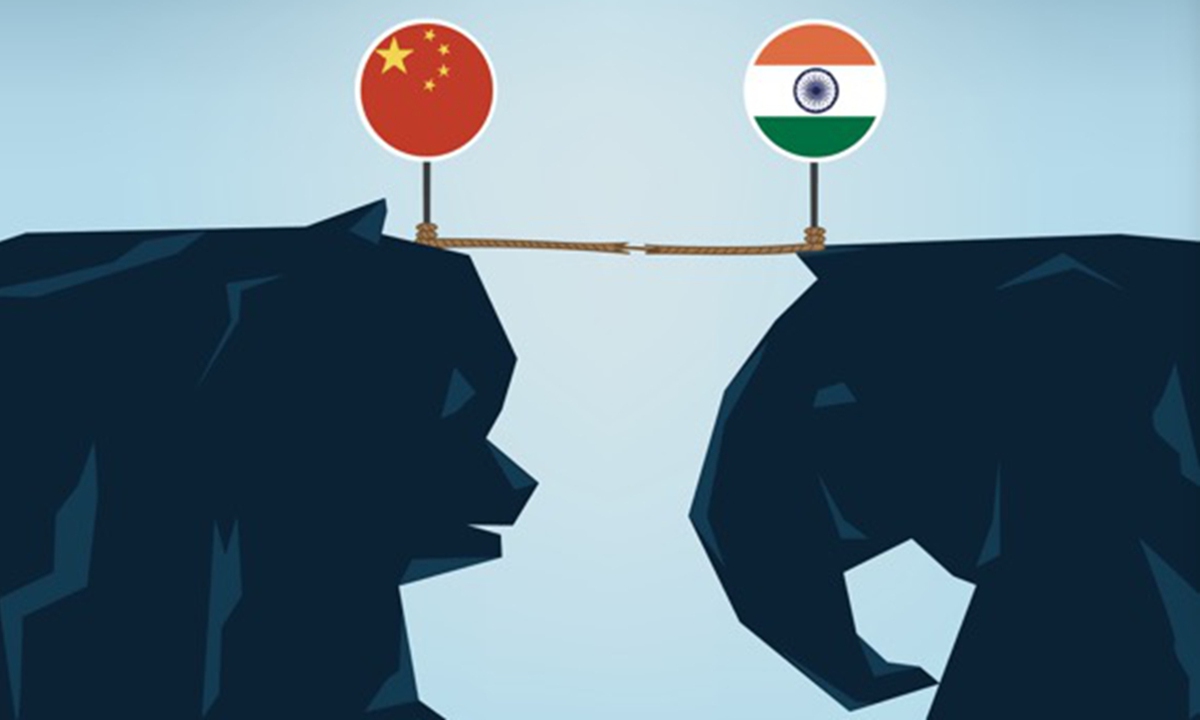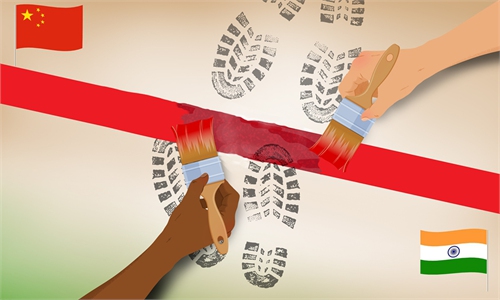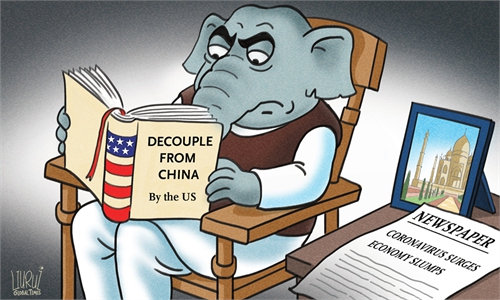China, India should enhance cooperation rather than hinder their relations due to border disputes

Illustration: GT
The border disputes have long plagued China-India relations. When it comes to the frictions on the border with China, India tends to pass the buck to Beijing, but India is well-aware of the rights and wrongs of the whole issue, according to experts. Against the background of complex regional and international situation, it is crucial for China and India to enhance cooperation rather than hinder the development of bilateral relations due to border disputes.
In an article entitled "A Historical Evaluation of China's India Policy: Lessons for India-China Relations," which is published by Carnegie India on Tuesday, Vijay Gokhale, former foreign secretary and former Indian ambassador to China, wrote that "the Chinese assumption that there will be no immediate backlash to low-level coercion on the LAC because India is risk-averse may no longer be valid." This line has drawn wide attention from a pile of media outlets.
Gokhale's remarks are representative among some Indian elites. Some of them are relatively assertive and even aggressive in terms of the China-India border frictions. It cannot rule out the possibility that Gokhale wants to cater to the rising nationalism in the country, in a bid to win the favor of the Modi government, Liu Zongyi, secretary-general of the Research Center for China-South Asia Cooperation at the Shanghai Institutes for International Studies, told the Global Times.
In addition to the Indian media, the Indian military has also repeatedly hyped its border frictions with China as well as exaggerated the so-called China threat theory, in an attempt to gain more defense budget. Under their constant exaggeration, in India, the nationalism against China has been on the rise, and many politicians are constantly catering to this sentiment, so as to create momentum and accumulate political capital for themselves.
According to Song Zhongping, a Chinese military expert and TV commentator, India's fresh mounting efforts to provoke China on the border issue have a lot to do with Washington. The joint military exercise held by India and the US near the Line of Actual Control (LAC) in the border area between China and India just concluded on December 2. And Washington has spared no effort to include India into its Indo-Pacific Strategy. After the clash between soldiers of China and India on December 9, the US said it will fully support India's effort. All these may trigger India to make a strategic miscalculation and ramp up its efforts to provoke China.
India is now in the stage of strategic transformation in diplomacy. It is making full use of its delicate relationship with China, the US, as well as some other major powers, to create opportunities for the sake of its own development. By taking advantage of the China-US competition, India moves closer to the US. By containing China with the US, India intends to promote the transfer of the global industrial chain and supply chain to India, realize India's rise as a great power and achieve its own strategic goals.
Of course, the Indian government is also fully aware of the importance of cooperation with China. Indian External Affairs Minister S Jaishankar said in August that an "Asian century" cannot happen if India and China don't join hands and emphasized that the two neighbors have "far more common interests than differences."
Although there exist quite some problems between China and India, it is in the common interests of the two countries to find an inclusive way to coexist and accommodate each other. On the concept of the "Asian century," and playing an important role in the future international relations, China and India have consensus.
According to Liu, India will assume the presidency of the G20 next year, a good opportunity for India to showcase its international status and influence. Therefore, it will make sure the event will be a success. "Diplomacy of India in 2023 will all be carried out surrounding G20 summit, to which it needs China's support. At this point, it is believed that the Modi government also wishes to stabilize bilateral relationship, even better if there is certain rebound."
But the border issue has long overshadowed China-India ties. As long as the border disputes exist between the two countries, the risk of on-site friction is difficult to completely be eliminated. The two sides need to cooperate at the strategic level and improve the external environment for border areas, in order to realize long-term stability and create condition for eventually solving the border issue.
Between China and India, common interests far outweigh differences. The two sides should focus on the big picture, help each other realize their goals rather than exhaust each other; strengthen cooperation rather than guard against each other; and build trust rather than mistrust.


